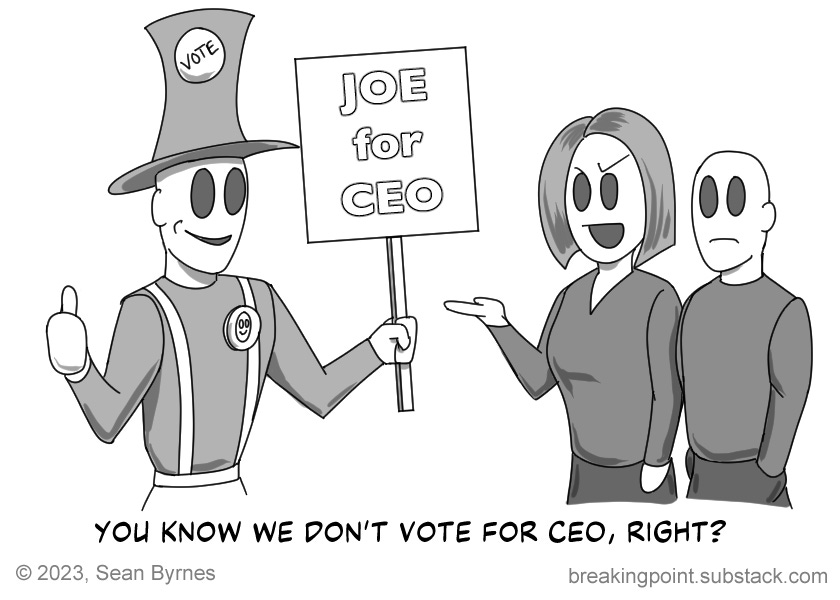Where do corporate politics come from?
Corporate politics exist because companies are made of people.
If you liked reading this, please click the ❤️ button on this post so more people can discover it on Substack. Thanks!
Corporate politics are a feature of almost all modern workplaces. It’s usually not enough to be good at your job, if you aren’t also good at politics it’s hard to get promoted and move ahead. At the same time, almost everyone hates corporate politics. If they are so distasteful why are they so common?
People are messy and companies are made of people, so we shouldn’t be surprised that companies are messy. Any company, regardless of how successful they are from the outside, feels like a mess on the inside. Even if you have perfect organization charts and processes there will be gaps in how well that structure is followed. Those gaps get filled with shadow structures and shadow processes.
Corporate politics live and grow in those shadows.
Is it possible to eliminate corporate politics? Maybe not entirely, but as a leader you can remove the incentives for people to spend time and energy on them. To do so, we first have to understand the root causes of politics.
Politics as an Operating System
One way to think of corporate politics is that they are an alternative operating system for your business. Your organizational chart might say Bob is in charge of something, but if everyone always goes to Sally for that same thing then who is really in charge? The chart says Bob but politics say Sally.
The real question is why do people go to Sally instead of Bob?
Your organization chart is a statement of intent. You might intend Bob to be in charge of something, but if Sally is better at it your team might realize that. They might go to Sally because she’s actually in charge, regardless of your intent.
Or, it might be that the team likes Sally more than Bob. This is a dangerous situation, because there might be valid reasons to prefer Sally to Bob but also many toxic (or illegal) reasons as well. Maybe they go to Sally because she’s easier to find than Bob, in which case you can fix the problem. Or maybe they go to Sally because she has more political capital, which is bad because this means it’s in Sally’s best interest to encourage and continue politics.
The important thing is to understand why the intent expressed in your organization and processes is being bypassed for an alternative. Is the alternative better? Great, then change everything to match the alternative. Is the alternative preferred? Why is it preferred, and are those reasons we can learn from or bad habits we need to eliminate. Whatever it is, we need the explicit structure of the company to match the actual structure of the company.
It needs to be said that many of these alternative systems arise from sexism, racism and many other forms of bigotry. You must always assume that is a possible motivation when examining them, and be sure it is not the case. If it is, fire quickly.
Politics as a Communication System
If your team has one person, it has perfect communication. Once you have two people, communication becomes imperfect (unless you can read minds). Once you have 100 people, communications become very messy.
The messier your communications, the more valuable information becomes. People can start to control the flow of information within the organization, and in doing so control the organization. This kind of control, and the incentive to do it, is another root cause of politics.
Consider a critical company project being run by Joe. Everyone wants to know how the project is going, but Joe is the only one who knows. Joe could share the status with everyone, or he could use it as political capital to get favors from other people. If knowing how a critical project is going is important, Joe has a lot of political currency he can spend to further his career.
The only way to avoid politics arising from information inequalities is transparency. If everyone knows everything then no one can benefit from withholding information from others. However, transparency is not easy and comes with its own challenges. Still, the investment is worthwhile if you consider the high cost of politics on productivity and motivation.
A simple experiment you can run is to think about opening up all information about everything in your business tomorrow. Where would it be the hardest to open up? What information would be the hardest to get and spread? That’s likely where you have politics growing right now.
Living With Politics
I have always prided myself on running companies with zero corporate politics. That doesn’t mean there were no politics, it just means the politics were not a factor in how anything was done. If you remove the incentive from politics, they can still exist but they aren’t an attractive way for anyone to spend their time.
Therein lies the key to corporate politics. You need to create structures where all the reasons people pursue politics don’t exist, so there is no advantage to getting good at them. If you can, then all the energy that other companies invest in politics you can invest in growing your business faster.
That sounds like an amazing competitive advantage to me.
For more on Leadership and Company Culture, see:



Nicely explained.
Everyone should have access to the information within the organization.
In Software development team. A new joiner struggles due to poor documentation and senior resources holding the knowledge. Refraining from giving KTs.
A better understanding of how organizational dynamics work would be helpful for many contexts. Corporate environments are one, but any bureaucracy is subject to the same dynamics.